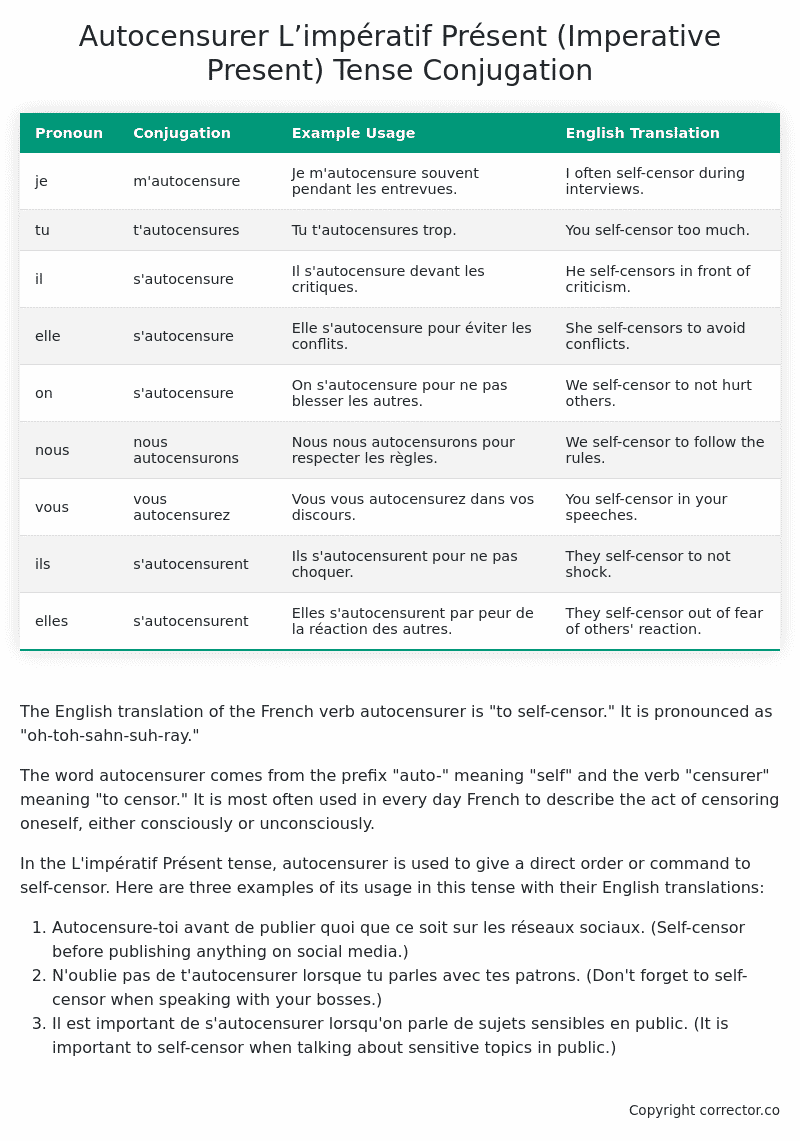L’impératif Présent (Imperative Present) Tense Conjugation of the French Verb autocensurer
Introduction to the verb autocensurer
The English translation of the French verb autocensurer is “to self-censor.” It is pronounced as “oh-toh-sahn-suh-ray.”
The word autocensurer comes from the prefix “auto-” meaning “self” and the verb “censurer” meaning “to censor.” It is most often used in every day French to describe the act of censoring oneself, either consciously or unconsciously.
In the L’impératif Présent tense, autocensurer is used to give a direct order or command to self-censor. Here are three examples of its usage in this tense with their English translations:
- Autocensure-toi avant de publier quoi que ce soit sur les réseaux sociaux. (Self-censor before publishing anything on social media.)
- N’oublie pas de t’autocensurer lorsque tu parles avec tes patrons. (Don’t forget to self-censor when speaking with your bosses.)
- Il est important de s’autocensurer lorsqu’on parle de sujets sensibles en public. (It is important to self-censor when talking about sensitive topics in public.)
Table of the L’impératif Présent (Imperative Present) Tense Conjugation of autocensurer
| Pronoun | Conjugation | Example Usage | English Translation |
|---|---|---|---|
| je | m’autocensure | Je m’autocensure souvent pendant les entrevues. | I often self-censor during interviews. |
| tu | t’autocensures | Tu t’autocensures trop. | You self-censor too much. |
| il | s’autocensure | Il s’autocensure devant les critiques. | He self-censors in front of criticism. |
| elle | s’autocensure | Elle s’autocensure pour éviter les conflits. | She self-censors to avoid conflicts. |
| on | s’autocensure | On s’autocensure pour ne pas blesser les autres. | We self-censor to not hurt others. |
| nous | nous autocensurons | Nous nous autocensurons pour respecter les règles. | We self-censor to follow the rules. |
| vous | vous autocensurez | Vous vous autocensurez dans vos discours. | You self-censor in your speeches. |
| ils | s’autocensurent | Ils s’autocensurent pour ne pas choquer. | They self-censor to not shock. |
| elles | s’autocensurent | Elles s’autocensurent par peur de la réaction des autres. | They self-censor out of fear of others’ reaction. |
Other Conjugations for Autocensurer.
Le Present (Present Tense) Conjugation of the French Verb autocensurer
Imparfait (Imperfect) Tense Conjugation of the French Verb autocensurer
Passé Simple (Simple Past) Tense Conjugation of the French Verb autocensurer
Passé Composé (Present Perfect) Tense Conjugation of the French Verb autocensurer
Futur Simple (Simple Future) Tense Conjugation of the French Verb autocensurer
Futur Proche (Near Future) Tense Conjugation of the French Verb autocensurer
Plus-que-parfait (Pluperfect) Tense Conjugation of the French Verb autocensurer
Passé Antérieur (Past Anterior) Tense Conjugation of the French Verb autocensurer
Futur Antérieur (Future Anterior) Tense Conjugation of the French Verb autocensurer
Subjonctif Présent (Subjunctive Present) Tense Conjugation of the French Verb autocensurer
Subjonctif Passé (Subjunctive Past) Tense Conjugation of the French Verb autocensurer
Subjonctif Imparfait (Subjunctive Imperfect) Tense Conjugation of the French Verb autocensurer
Conditionnel Présent (Conditional Present) Tense Conjugation of the French Verb autocensurer
Conditionnel Passé (Conditional Past) Tense Conjugation of the French Verb autocensurer
L’impératif Présent (Imperative Present) Tense Conjugation of the French Verb autocensurer (this article)
L’infinitif Présent (Infinitive Present) Tense Conjugation of the French Verb autocensurer
Struggling with French verbs or the language in general? Why not use our free French Grammar Checker – no registration required!
Get a FREE Download Study Sheet of this Conjugation 🔥
Simply right click the image below, click “save image” and get your free reference for the autocensurer L’impératif Présent tense conjugation!

Autocensurer – About the French L’impératif Présent (Imperative Present) Tense
Usage
Giving commands
Making requests
Offering advice
Expressing desires
Conjugation Formation
Interactions with other tenses
Want More?
I hope you enjoyed this article on the verb autocensurer. Still in a learning mood? Check out another TOTALLY random French verb conjugation!


